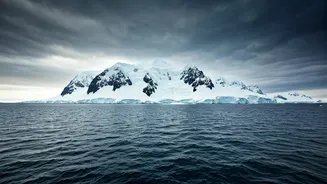Alarming Melting Rates
Recent findings reveal that Antarctica is melting at a rate exceeding earlier estimations, a significant concern for the global climate. The situation
is further complicated by the imminent approach of various climate tipping points, thresholds beyond which changes become irreversible. The accelerating melting is causing considerable stress on the Antarctic ice sheets, with potentially severe implications for global sea levels and ecosystems. This rapid ice loss poses a clear and present threat to coastal communities and marine life worldwide. The scientific community is actively monitoring the progression of these trends, striving to grasp the complex dynamics behind the accelerating melting and predicting its long-term impacts accurately.
Irreversible Climate Shifts
Scientists have determined that Antarctica is nearing tipping points, signaling the onset of potentially irreversible climate changes. These tipping points represent critical thresholds within the climate system, where even minor alterations can trigger substantial and lasting effects. The consequences of these irreversible shifts include accelerated ice sheet melting, shifts in ocean currents, and changes to global weather patterns. The concept of tipping points emphasizes the urgency of climate action, as once these points are crossed, mitigating the impacts becomes significantly more challenging. Experts are focusing on forecasting these tipping points with greater precision to inform effective and prompt policy and strategic interventions.
Impacts on Ecosystems
The accelerated melting of Antarctica has drastic effects on both the region’s ecosystems and those elsewhere. The loss of ice significantly disrupts habitats, harming the delicate balance of life in and around the Antarctic. Rising sea levels, a direct consequence of the melting ice, threaten coastal environments and the diverse ecosystems they support. Moreover, the melting ice releases freshwater into the ocean, disrupting ocean salinity and currents, impacting marine ecosystems worldwide. These changes can trigger a cascade effect, leading to habitat loss, biodiversity decline, and, ultimately, affecting the stability of the global climate system. The interconnectedness of these effects underscores the critical need for global collaboration to protect Antarctic ecosystems and reduce the climate impacts.
Urgent Need for Action
The scientific community's findings highlight an urgent need for swift and decisive action to mitigate climate change and protect Antarctica. The reports stress the critical importance of reducing greenhouse gas emissions on a global scale. This can be achieved through initiatives that promote renewable energy, sustainable practices, and strategic policies. Investing in robust climate research and monitoring is essential for better understanding the evolving dynamics of Antarctica and accurately predicting future impacts. Further, implementing conservation efforts, such as protecting vulnerable ecosystems and managing resources responsibly, is crucial in building resilience. International cooperation and commitment are key to addressing this global challenge and protecting our planet's future.




















